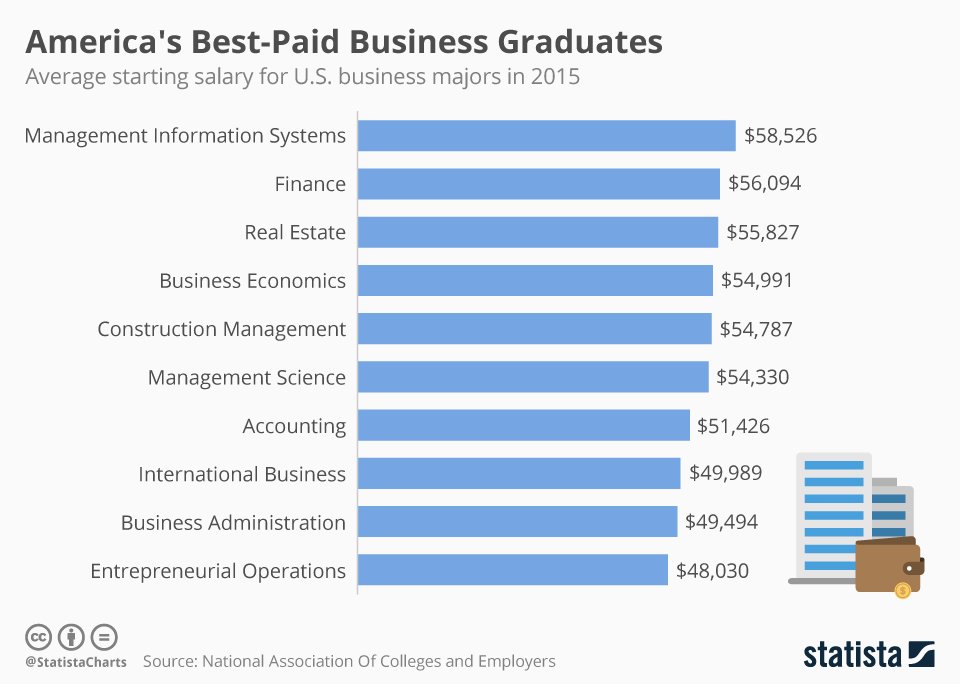Curious about business degree salary? In the competitive world of business, your earning potential is a key consideration. So, what can you expect with a business degree salary? The truth is, a business degree opens a myriad of opportunities for lucrative pay scales, ranging from entry-level positions to executive roles. As you navigate the realm of business careers, understanding the earning potential of a business degree salary is crucial for your future success. Let’s dive into the insights and explore the exciting prospects that await those with a business degree.
The Impact of a Business Degree on Salary
Choosing to pursue a business degree can have a significant impact on your earning potential and career opportunities. In this comprehensive guide, we will delve into how a business degree can influence your salary, the various factors that determine salary levels, and the potential career paths available to business degree graduates.
Understanding the Value of a Business Degree
A business degree is highly valued in today’s competitive job market due to its versatility and relevance across various industries. Let’s explore why a business degree is considered a valuable asset:
- Wide Range of Skills: A business degree equips you with a diverse set of skills, including critical thinking, problem-solving, communication, and analytical abilities.
- Specialized Knowledge: Business programs offer specialized concentrations such as finance, marketing, management, or entrepreneurship, allowing you to develop expertise in a particular area.
- Global Perspective: In an increasingly interconnected world, business programs often incorporate international perspectives, preparing graduates for a globalized marketplace.
- Career Flexibility: A business degree opens doors to a wide range of career paths in various sectors, providing flexibility and opportunities for advancement.
Factors Influencing Business Degree Salary
Several factors play a crucial role in determining the salary potential of individuals with a business degree. Let’s examine these key factors:
1. Level of Education
The level of education attained, such as a bachelor’s, master’s, or doctoral degree, can significantly impact salary potential. Higher levels of education often correlate with higher earning potential.
2. Specialization
Specializing in a specific field within business, such as finance, accounting, or marketing, can lead to higher salaries due to the expertise and in-demand skills associated with specialized roles.
3. Work Experience
Accumulating relevant work experience through internships, co-op programs, or full-time positions can enhance your marketability and lead to higher salary offers upon graduation.
4. Industry and Location
Salaries can vary based on the industry and geographic location. Certain industries, such as finance or technology, offer higher salary potential, while living in high-cost-of-living areas may result in higher compensation packages.
5. Company Size and Reputation
The size and reputation of the company you work for can impact salary levels. Established companies or Fortune 500 firms may offer higher salaries and additional benefits compared to smaller organizations.
Potential Career Paths for Business Degree Graduates
Business degree holders have a wide array of career paths to choose from, depending on their interests, skills, and aspirations. Here are some popular career options for individuals with a business degree:
1. Financial Analyst
Financial analysts assess the performance of stocks, bonds, and other investments to provide guidance to businesses and individuals regarding investment decisions.
2. Marketing Manager
Marketing managers oversee promotional and advertising campaigns to generate interest in products or services, analyzing market trends and consumer behavior to develop effective strategies.
3. Human Resources Manager
Human resources managers are responsible for recruiting, training, and managing employees within an organization, ensuring compliance with labor laws and fostering a positive work environment.
4. Management Consultant
Management consultants provide strategic advice to organizations on improving efficiency, solving problems, and maximizing growth opportunities through data analysis and industry expertise.
5. Entrepreneur/Small Business Owner
Entrepreneurs leverage their business acumen to start and manage their ventures, taking on the risks and rewards of creating successful businesses in various industries.
Salary Outlook for Business Degree Holders
The earning potential for individuals with a business degree varies depending on several factors, including education, specialization, experience, and industry. Here is an overview of the salary outlook for some common business-related professions:
| Profession | Average Salary Range |
|---|---|
| Financial Analyst | $60,000 – $100,000 |
| Marketing Manager | $70,000 – $130,000 |
| Human Resources Manager | $60,000 – $120,000 |
| Management Consultant | $70,000 – $150,000 |
| Entrepreneur/Small Business Owner | Variable, depending on business success |
It’s essential to note that these salary ranges are approximate and can vary based on location, experience level, and industry demand. Continuous learning, skill development, and networking can also contribute to increasing your earning potential over time.
High Paying Careers with Business Degree
Frequently Asked Questions
What is the average salary for someone with a business degree?
The average salary for someone with a business degree can vary depending on factors such as job position, level of experience, and location. Generally, entry-level positions for business degree holders can expect salaries ranging from $40,000 to $60,000 per year, while those with more experience or in managerial roles can earn upwards of $100,000 per year.
How does having a business degree impact earning potential?
Having a business degree can significantly impact earning potential. Individuals with a business degree often have access to a wider range of job opportunities in various industries that offer higher salaries compared to those without a degree. Employers may also value the skills and knowledge gained through a business degree, leading to better salary offers and advancement opportunities.
Are there specific areas within business where professionals tend to earn higher salaries?
Yes, certain specializations within the field of business are known to offer higher earning potentials. For example, professionals in finance, marketing, consulting, and management roles often command higher salaries due to the specialized skills and expertise required in these areas. Additionally, industries such as technology, healthcare, and finance tend to offer competitive salaries for business degree holders.
What factors can influence the salary range for individuals with a business degree?
Several factors can influence the salary range for individuals with a business degree, including level of education, work experience, industry, geographical location, and job role. Advanced degrees such as MBAs or specialized certifications can also impact salary potential, as well as the reputation of the institution where the degree was obtained.
Is there a significant difference in earnings between individuals with a bachelor’s degree in business versus a master’s degree?
Individuals with a master’s degree in business, such as an MBA, typically have the potential to earn higher salaries compared to those with a bachelor’s degree. The advanced skills, knowledge, and professional network gained through a master’s degree program can position individuals for leadership roles and higher-paying opportunities within their chosen field. It is not uncommon for MBA graduates to earn significantly more than those with just a bachelor’s degree in business.
Final Thoughts
In conclusion, a business degree salary can vary based on various factors such as experience, industry, and location. It offers competitive earning potential and opportunities for growth in the corporate world. Research shows that individuals with a business degree tend to earn higher salaries than those without one. Considering the market demand for business professionals, pursuing a business degree can enhance your career prospects and financial stability in the long run. So, investing in a business degree could potentially lead to lucrative financial returns.






